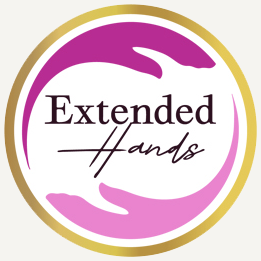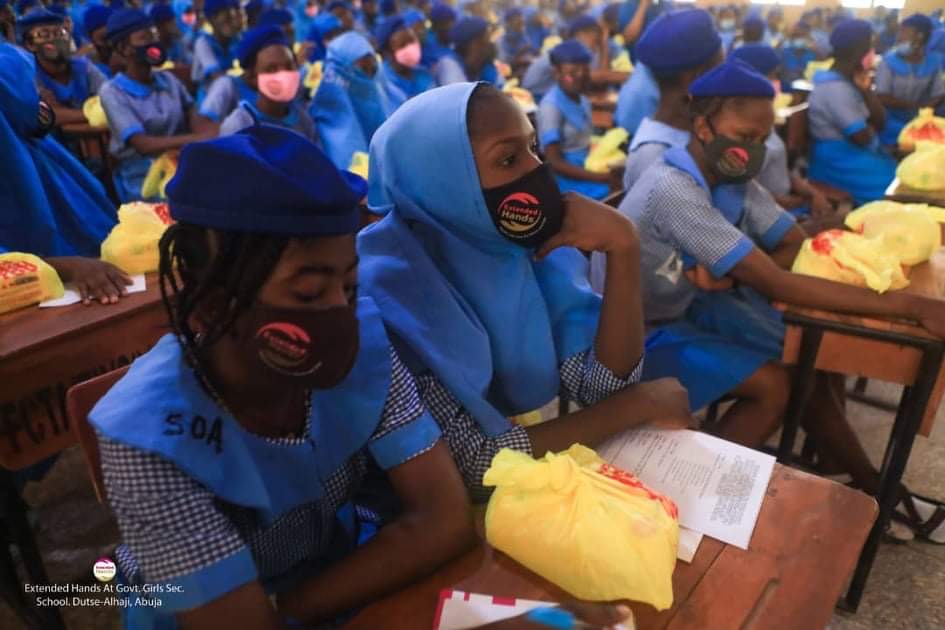Brief on Executed Event of Period-Poverty Alleviation Among Rural Women/Girls in Nigeria:
Pads4pals Organized for the Government Girls Secondary School, Dutse-Alhaji, Abuja by the Extended Hands (Nigeria Chapter) On Tuesday, 30th March, 2021
The event of Period-Poverty Alleviation Among Rural Women/Girls in Nigeria: Pads4Pals was successfully executed by the Extended Hands Team for the school-girls of the Government Girls Secondary School, Dutse-Alhaji, Abuja on 30th March, 2021.
The primary objective of the project was to support the less privileged women/girls in Nigeria by mitigating period poverty with the distribution of 500 free packs of menstrual products and 500 customized nose masks given the trending COVID-19 pandemic across the globe, including light refreshments.
The EH Team comprised of 10 members including the Project Coordinator. After due consultations, the Government Girls Secondary School in Dutse-Alhaji was selected to test-run EH’s pilot intervention in Nigeria to assess the rate of period poverty among school-girls and their sense of acceptability as well as their awareness/knowledge of menstrual health.
The school stands at a total of 2,430 students (all female) and over 50 teaching staff. Hence, supplementary provisions were made as follows: 80 pads, 80 nose masks, 7 branded T-shirts, and 7 branded caps for the Management Staff of both the Education Board and the School, being the standard practice laid down for NGOs.
The target audience was female students. The school hall with a maximum capacity of 500 – 600 persons was used as the venue, powered with a generator (due to light-out) and a public address system with 2 microphones (hired). The output was vividly audible to the assembled students/staff. All the Team members were in uniform (branded T-shirts/Caps) for easy identification.
Education/Sensitisation on Menstrual Hygiene Management practices, disadvantages of poor menstrual management, menstrual stigma and safe disposal of used pads were extensively discussed to improve the knowledge of the students and circumvent future possible health crises arising from unhygienic menstrual management. The lecture lasted for 30 minutes including a Questions Session whereby the students asked numerous questions about menstruation while health experts supplied satisfactory answers.
Some students were interviewed by EH’s rep. to ascertain their level of understanding and benefits deduced from the lecture. Their responses were impressive as they reiterated benefits, expressed joy and acclaimed EH for her timely aid and support. The teachers, in the same manner, applauded EH’s humanitarian services, among other visiting NGOs and requested a more comprehensive programme for the entire students to efface the disappointment of those who could not benefit.
CONCLUSION/RECOMMENDATIONS
From the above inferences, the successful EH’s pilot project geared towards alleviating period poverty through “Pads4Pals” for the vulnerable women/girls in Nigeria (maiden edition) has proven beyond reasonable doubts that there is a need for continuous intervention programmes which would gradually integrate the vulnerable into the society with a sense of belonging to flourish. Nigeria has recorded over 60% of women/girls living below the poverty line due to lingering economic challenges. Furthermore, in line with the 2019 Campaign of the UK Government to end period poverty and stigma by 2030, there is a need for more inclusive and massive interventions to reach out to women/girls in the suburbs across Nigeria.















